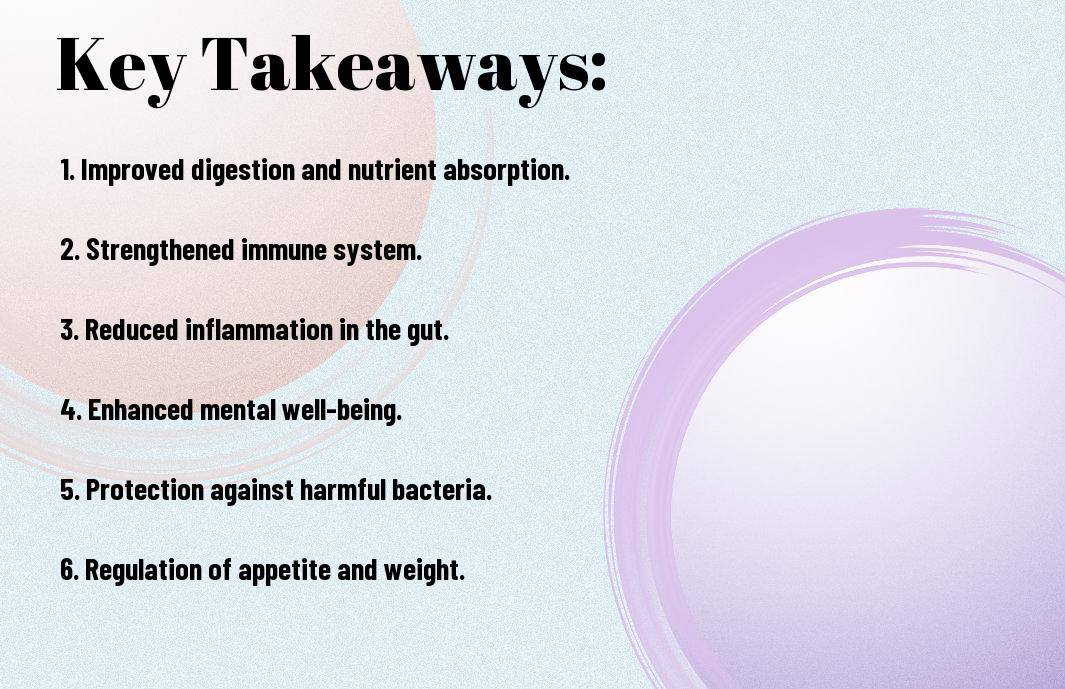
Newsletter Subscribe
Enter your email address below and subscribe to our newsletter

Enter your email address below and subscribe to our newsletter

You may not realize it, but the health of your gut bacteria plays a crucial role in your overall well-being. In this article, I will discuss six key benefits that good gut bacteria can provide to protect you from digestive issues. By understanding how these benefits work, you can take proactive steps to improve your gut health and avoid common digestive problems.

While you may not realize it, your gut bacteria plays a crucial role in supporting your immune system. A healthy balance of gut flora helps regulate immune responses, making sure your body can effectively fight off harmful pathogens. When your gut bacteria are out of balance, it can weaken your immune system and leave you more susceptible to infections and illness.
Boosting the immune system, the Gut-Associated Lymphoid Tissue (GALT) is a vital component of your body’s defense mechanism. This network of lymphoid tissue is located in the gastrointestinal tract and helps monitor the gut flora to distinguish between friend and foe. Through this surveillance, GALT helps prevent harmful bacteria from causing infections and promotes the growth of beneficial bacteria to support overall health.
One key way gut bacteria benefit your digestive system is by enhancing nutrient absorption. Beneficial bacteria help break down food particles and assist in the absorption of vital nutrients like vitamins, minerals, and amino acids. This process is crucial for overall health and well-being.
Digestion is greatly improved when the balance of gut bacteria is maintained. Studies have shown that probiotics, the good bacteria in your gut, can help reduce symptoms of irritable bowel syndrome (IBS) and inflammatory bowel disease (IBD). These conditions can cause discomfort and disrupt daily life, but a healthy gut can alleviate these issues.
Plus, by promoting the growth of beneficial gut bacteria through diet and supplements, you can help alleviate symptoms of these digestive disorders and restore balance to your gut microbiome.
Nutrient absorption plays a vital role in maintaining regular bowel movements. Healthy gut flora can help regulate bowel function by aiding in the breakdown of food and promoting efficient digestion. Fiber-rich foods and probiotic supplements can support the growth of beneficial bacteria and improve bowel regularity, preventing issues like constipation and diarrhea.
Influence: An imbalance in gut bacteria can lead to digestive problems and irregularity, affecting your overall well-being. By prioritizing a diet rich in prebiotic and probiotic foods, you can support a healthy gut microbiome and promote optimal digestive function.
Unlike How Does Your Gut Microbiome Impact Your Overall Health?, the role of gut bacteria in weight management is crucial. Research shows that the composition of your gut bacteria can influence your body weight. Your gut microbiome plays a significant role in how your body absorbs nutrients from food, which can impact weight gain or weight loss.
An imbalance in gut bacteria can lead to a slower metabolic rate, making it harder for you to burn calories efficiently. This can contribute to weight gain over time. By maintaining a healthy balance of gut bacteria, you can support a faster metabolism and better weight management.
Any disruption in your gut microbiome can influence the production of hormones that regulate hunger and satiety, such as ghrelin and leptin. Ghrelin is known as the “hunger hormone,” signaling your brain that it’s time to eat, while leptin is the “satiety hormone” that tells your brain you’re full. Imbalances in these hormones can lead to overeating and weight gain.
Affects: It’s necessary to maintain a healthy gut microbiome to ensure these hunger and satiety hormones are properly regulated. By nurturing a diverse and balanced gut bacteria population through a healthy diet rich in fiber and probiotics, you can support optimal hormone production and better control your appetite, ultimately aiding in weight management.
For optimal body composition and weight management, the diversity of gut bacteria is critical. A lack of microbial diversity in the gut has been linked to obesity and weight-related issues. By promoting a varied and healthy gut microbiome, you can support a healthy weight and body composition.
Impact: The balance of gut bacteria in your microbiome can significantly impact your body composition. By fostering a diverse range of beneficial bacteria through a diet rich in prebiotic and probiotic foods, you can support healthy weight management and overall well-being.

To Bacteria, the gut-brain axis is a crucial link between our digestive system and our mental health. Gut bacteria play a significant role in influencing our mood and emotions through this intricate connection. When the balance of good bacteria in the gut is disrupted, it can impact neurotransmitter production and signaling, leading to mood imbalances and mental health issues.
Benefits of having a healthy gut microbiome include reducing symptoms of anxiety and depression. Studies have shown that certain strains of beneficial gut bacteria can help regulate stress responses and improve mood. By maintaining a diverse and balanced gut microbiota, we can positively impact our mental well-being and overall emotional health.
GutBrain bacteria also play a vital role in neuroplasticity, which is the brain’s ability to form new connections and reorganize itself. By interacting with the central nervous system, gut bacteria can influence brain functions related to learning, memory, and mood regulation. This highlights the importance of fostering a healthy gut microbiome for optimal cognitive and emotional functioning.

All Strengthen Your Good Gut Bacteria and Boost Health begins with the gut. When your gut bacteria are in balance, it can have a profound impact on your skin health. Here are a few ways your gut bacteria benefit your skin:
For your skin to stay healthy, your gut must be in good shape. Research suggests that an imbalance in gut bacteria can lead to skin conditions like acne, eczema, and psoriasis.
Skin inflammation can often be linked to an imbalance in your gut bacteria. When harmful bacteria outnumber the beneficial ones, it can trigger inflammatory responses in the skin, leading to conditions like acne and eczema.
This imbalance can also compromise your skin’s ability to heal and repair itself, leaving you more susceptible to prolonged skin issues.
The health of your gut can significantly impact how your skin ages. An imbalance in gut bacteria can lead to increased oxidative stress and inflammation in the body, accelerating the aging process.
Plus, an unhealthy gut can impair the production of collagen and elastin, two vital proteins for maintaining skin elasticity and firmness.

For many years, researchers have been uncovering the incredible benefits of gut bacteria in reducing inflammation. These tiny microbes play a crucial role in regulating our body’s immune response and can help lower inflammation levels throughout the body.
On the subject of chronic inflammation, gut bacteria have been shown to have a significant impact. A diverse and balanced gut microbiome can help prevent the development of chronic inflammation which is linked to various health conditions such as heart disease, diabetes, and autoimmune disorders.
A healthy gut flora promotes the production of short-chain fatty acids (SCFAs) that have potent anti-inflammatory effects in the body. By maintaining a diverse microbial ecosystem in the gut, we can ensure that inflammation is kept in check, benefiting our overall health.
On the topic of systemic inflammation, the health of our gut plays a vital role in keeping it in check. A compromised gut lining can lead to the leakage of harmful substances into the bloodstream, triggering an immune response and causing widespread inflammation throughout the body.
Inflammation is a natural and necessary response by the body’s immune system to protect against harm. However, when inflammation becomes chronic and unresolved, it can lead to a host of health problems. By nurturing a healthy gut environment through probiotics, prebiotics, and a balanced diet, we can support our gut bacteria in their role of reducing inflammation and safeguarding our well-being.
Considering all points, I hope this article has shed some light on the importance of maintaining a healthy gut bacteria balance. By incorporating these top gut bacteria benefits into your lifestyle, you can potentially save yourself from various digestive problems and overall improve your well-being. Note, a happy gut leads to a happy life!
A: Gut bacteria are microorganisms that reside in the digestive tract and play a crucial role in digestion, immune function, and overall health.
A: Gut bacteria are important because they help with digesting food, synthesizing certain vitamins, and protecting the gut from harmful bacteria.
A: Gut bacteria can benefit digestive health by breaking down food, aiding in nutrient absorption, and supporting overall gut function.
A: The top benefits of gut bacteria for digestive problems include improved digestion, reduced inflammation, enhanced immune function, and prevention of digestive disorders.
A: Gut bacteria can help save you from digestive problems by maintaining a healthy balance of microorganisms in the gut, which can prevent issues such as bloating, gas, constipation, and diarrhea.
A: In addition to digestive health, gut bacteria also play a role in mental health, weight management, skin health, and immune system support.
A: You can support and nurture a healthy balance of gut bacteria by consuming a diverse range of fiber-rich foods, probiotics, prebiotics, and fermented foods, as well as avoiding excessive use of antibiotics and maintaining a healthy lifestyle.